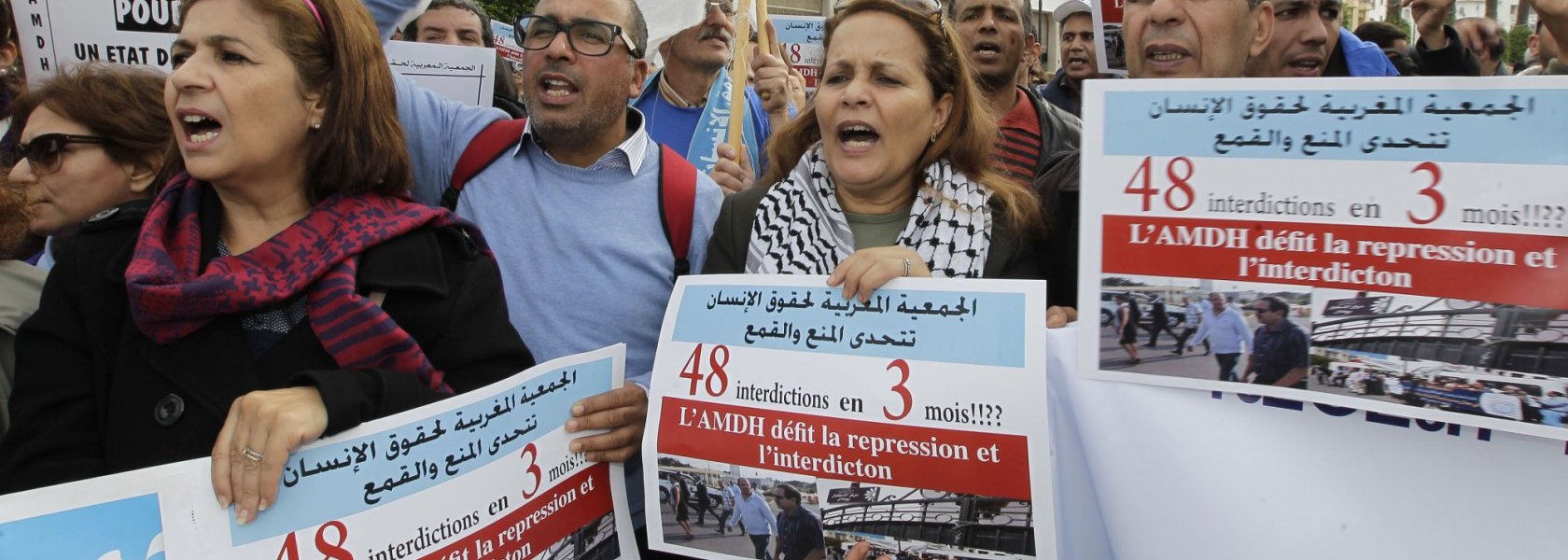Paris-Geneva, January 25, 2018 – The Observatory for the Protection of Human Rights Defenders (a FIDH-OMCT partnership) is publishing a report describing the shrinking workspace for independent civil society in Morocco, which affects a growing number of human rights organizations. Constraints and administrative harassment undermine the constitutional gains of 2011, achieved in the wake of the "February 20" Movement and the "Arab Spring".

In 2011, Morocco adopted a new constitution by referendum which guarantees more freedoms and human rights. It includes the freedoms of opinion and expression; association; gatherings and peaceful demonstrations. The Kingdom is also bound by the legal obligations contained in the many international conventions it has ratified.
However, because of the subjects they defend, some non-governmental organizations (NGOs) for the defence of human rights operate in an ever more unfavorable context, the rights enshrined in the Constitution being less and less respected by the administrative and police authorities. This deterioration accelerated in 2014, following the speech of the Minister of the Interior in Parliament. He accused human rights groups of receiving funds from abroad to carry out actions that undermine the security and image of Morocco.
The report details how three processes are used by the Moroccan authorities to hinder their activities. Barriers in registration procedures (refusal of filing, time limits), including for emblematic human rights organizations in Morocco, prevent them from existing legally, to open a bank account to obtain a place and to sue. In addition, activities (events, public meetings) organized by NGOs are regularly prohibited. Finally, their access to finance is hindered by the lack of registration or final receipt, preventing NGOs from opening a bank account and limiting their access to funding. This access has become even more problematic with the new obligation for international donors to contact the Moroccan Ministry of Foreign Affairs before any funding is given to Moroccan associations. While this new mechanism of March 2017 officially aims to fight the financing of terrorist groups, it is feared that it can be used to control the funding of independent NGOs critical of the human rights situation in Morocco.
This gradual smothering of independent associations is taking place as the country faces new social movements since the end of 2016.
" While protests and demonstrations in the Rif are likely to degenerate into further violence, it is essential that the country respect its own Constitution and its international commitments on freedom of expression, association, and assembly. Morocco must also guarantee the safety of members and local human rights NGOs, " said Hafidha Chekhir, vice president of FIDH.
Finally, despite favorable jurisprudence for human rights NGOs, the Moroccan authorities almost systematically prohibit the activities of foreign NGOs or their Moroccan branches. For example, Transparency Morocco, an anti-corruption organization, has seen its activities banned several times since 2013. Several legal experts and international observers have been expelled. For example, Amnesty International and Human Rights Watch are no longer allowed to conduct their investigations in the country.
" Government rhetoric voluntarily conflates the work of human rights NGOs with terrorism and religious extremism. The hostility against them, which sometimes takes the form of judicial harassment, must stop immediately " denounced Gerald Staberock, Secretary General of OMCT.
The Observatory calls on the Moroccan authorities to put an end to the obstacles to freedom of association and to respect all the rights guaranteed by the international and regional human rights instruments ratified by Morocco, in particular with regard to freedom of association, assembly, assembly, peaceful protest, and expression.
Directors of the publication: Dimitris Christopoulos, Gerald Staberock
Authors of the report: Marie-Aure Perreaut, Hugo Gabbero
Editing and coordination: Marie-Aure Perreaut, Hugo Gabbero, Juliette Cheanne


